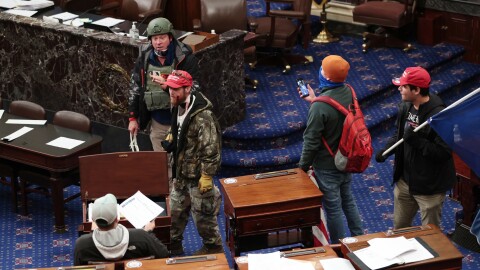Updated March 14, 2025 at 17:26 PM ET
Editor's note: This story was first published on Feb. 9, 2021. It was regularly updated and includes explicit language.
On Jan. 6, 2021, supporters of then-President Donald Trump stormed the U.S. Capitol, injuring approximately 140 law enforcement officers, forcing a panicked evacuation of the nation's political leaders, and threatening the peaceful transfer of power.
Five people died during or soon after the riot, and more than $2.9 million worth of damage was done to the Capitol. Rioters brought firearms, knives, hatchets, pepper spray, baseball bats and other improvised weapons to the Capitol grounds and prosecutors say many of those weapons were used to assault police. In the aftermath of the attack, the Federal Bureau of Investigation referred to the siege as an act of domestic terrorism. In response, the Department of Justice launched the largest criminal investigation in U.S. history.
On Jan. 20, 2025, the first day of President Trump's second term, he granted relief to every defendant charged in connection with the violent attack. Trump's stated that he was ending a "grave national injustice that has been perpetrated upon the American people over the last four years and begins a process of national reconciliation."
Nearly every defendant, including those who assaulted police and conspired to plan the attack, received a pardon. In 14 cases, Trump granted the defendants a commutation, ending their prison sentence, but leaving the felony on their records.
Loading...
NPR tracked every federal criminal case stemming from that day's events. This database makes publicly available — and searchable — information on hundreds of cases and defendants, including alleged affiliation with extremist ideologies and past or present police or military experience. Although nearly every defendant has now been pardoned and cases are in the process of being dismissed, this database summarizes the charges that were brought and the cases that were prosecuted and tried.
Explore the Jan. 6 Capitol riot cases
Loading...
About this story
This is a project from NPR's Investigations and News Apps teams. NPR's Tom Dreisbach, Meg Anderson, Dina Temple-Raston, Monika Evstatieva, Barbara Van Woerkom, Arezou Rezvani, Barrie Hardymon, Tim Mak, Austin Fast, Emine Yücel, Allison Mollenkamp, Nick McMillan, and Noah Caldwell contributed reporting to this project; NPR's Connie Hanzhang Jin and Alyson Hurt built the database; and NPR's Emily Bogle, Catie Dull, Michele Abercrombie, Di'Amond Moore, and Grace Widyatmadja identified photographs.
Copyright 2025 NPR












